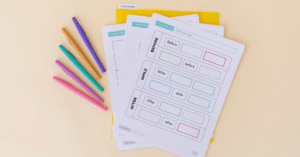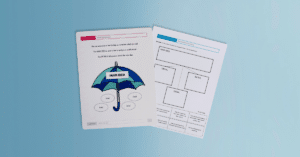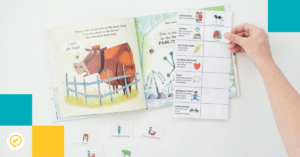Listen on Apple Podcasts Listen on Spotify
Get ready for more Literacy-Based Therapy Bootcamp, SLP!
Last week we discussed choosing a text (go back if you haven’t listened yet!) and in this episode, Marisha dives into steps one and two of Dr. Ukrainetz’ literacy-based therapy framework: pre-story knowledge activation and reading the text.
Pre-Story Knowledge Activation and Reading the Text
If you’re used to skill-based drill therapy, you might find yourself thinking that the steps Marisha discusses in this episode are more fluffy than effective — because that’s what she thought earlier in her practice too! It was hard to see how the exercises would be helpful or therapeutic.
But with time, research, and experience, Marisha began observing how powerful literacy-based therapy can be! (More on that when we get into the skill-based practice component of our bootcamp series. 👀)
💡 There are courses in the SLP Now Academy that cover strategies that you can use to target specific skills. For example, in the Grammar Bootcamp Course, we talk about how to use focus stimulation as you’re going through these pre story knowledge activation activities.
It’s incredibly helpful in building students’ prior knowledge and setting them up for success, while targeting their goals strategically and in a meaningful context. According to the evidence, this will help with generalization! 💡
Episode Summary
In this episode, Marisha talks about:
✅ The value of doing a book walk
✅ Using a KWL chart for pre-story activation
✅ The skepticism about the efficacy of these activities
✅ The importance of background knowledge
✅ How these steps set the stage for drill-based activities
✅ Using a story grammar organizer
✅ Keeping students engaged in the activity
This episode is short, sweet, and jam-packed with practical insights and strategies that set the foundation for literacy-based therapy, fostering engagement, and language development.
Happy listening! 🎙️✨
Links Mentioned
💛 KWL Chart (In the SLP Now Membership)
💛 SLP Now Grammar Bookcamp – Evidence-based Strategies (included in the SLP Now Membership)
💛 Ukrainetz, T. (2007). Contextualized language intervention: Scaffolding PreK–12 literacy achievement. Eau Claire, WI: Thinking Publications.
Subscribe
Subscribe to the SLP Now podcast and stay tuned for our next series. We’re kicking off September by helping you get your data collection, paperwork, and therapy planning processes in tip-top shape! 💪
Listen to The SLP Now Podcast on Apple ★ Spotify ★ Google ★ Stitcher ★ Castbox or wherever you listen to podcasts.
Transcript
Hello there and welcome to the SLP Now Podcast, where we share practical therapy tips and ideas for busy speech-language pathologists. Grab your favorite beverage and sit back as we dive into this week's episode.
Welcome to day two of the Literacy-Based Therapy Challenge. Today we are focusing on step one and step two of the literacy-based therapy framework. Yesterday we spent our time talking about how to select a text.
So today we're combining the first two days in one. So if you want to open up your workbook to the page that talks about pre-story knowledge activation, that's where you can find some of our notes. But I just wanted to run through a couple quick ideas on what we can do for step one, as well as just a quick overview of the strategies that I like to use when it comes to actually reading the text and keeping students engaged.
So with the first part, for step one, pre-story knowledge activation, I really like to start with a book walk. So this is where we pull out the book or the article, we look at the cover and then some of the pages and talk about what we see. Or if we're looking at an article, we'll look at any pictures that are in the article, headings. We might skim through some of the paragraphs and have some discussion around what we know about the topic.
A really great supplement to this is using a KWL chart. So K stands for what we know, W stands for what we want to know, and then L stands for what we learned. So if we are reading a book about farm animals, we might just brainstorm all of our ideas, think about what we know about farm animals, and then what are things that we want to know about the farm animals? This can be a really good indicator. If we've got lots of conversation flowing, one of the students has a grandpa who has a farm and has lots of experience, or they grew up on a farm. We would have a very rich dialogue.
But if we're working in a inner city school and the kiddos haven't had much exposure to farms or farm animals, we would be doing a lot more background work. So if that's the case, if they indicate a need for additional background knowledge, because this is extremely, extremely important, I might take the time to do a virtual field trip. For example, we might pull up a National Geographic video or something from YouTube, maybe taking a tour of a farm just to help us build that background knowledge of that concept. That will really set students up for success as we dive into the vocabulary and the comprehension and all of those different aspects. So that's a very important component.
I thought this when I was first starting out, I was very used to doing drill based therapy and I thought this was just silly. I thought it was just fluff. There's no way that this is going to be helpful. How am I going to be therapeutic in these activities? I had all these questions running through my head, as I'm sure you do right now too. So we'll talk about this more as we get into this skill-based practice, day four. But there also are a number of courses in the SLP Now Academy where we dive into specific strategies that you can use for specific skills.
So one example in the Grammar Bootcamp course, we talk about how to use focus stimulation as you're going through these pre-story knowledge activation activities. So it's incredibly helpful in building students' prior knowledge, setting them up for success, but it also enables us to target their goals in a very strategic way and in a much more meaningful context. There's evidence in the literature to suggest that this would help with generalization, and of course, we will still take our internal data and use our internal evidence and clinical judgment to decide what makes the most sense. But I just wanted to bring that up because that is an objection that I definitely had when starting out. But we can absolutely be strategic as we're diving into these activities.
Then the last thing that I like to do in this unit is a little bit of an inferencing activity. So I grab my story grammar organizer, and I have students guess who the characters are, what the setting is, what the problem, like the initiating event and all of that. We fill in the story grammar organizer and guess what the story will be about. I think that's a really nice way, after we've done some of that. It's a great language activity. We can target all sorts of goals within it, but it's also a great way to integrate what we've learned from the KWL chart, the virtual field trip, the book walk, all of that good stuff. So it's a very language-rich, really meaningful activity.
Then once that's all done, this can take several sessions depending on the group. But once we've done that pre-story knowledge activation, we just dive in and read the book. I don't spend a ton of time here. I like to read through it and just make sure that students are engaged. This can look different depending on the age group. For my littles in person, we might have sit spots. If we're doing a virtual session, I might watch a YouTube video and then catch students being good. If it looks like they're attending to it, we'll have some rewards there or stop and ask a couple questions just to make sure they're engaged.
Then the same types of strategies could work with older students, just checking in occasionally and watching their body language to make sure that they're actually listening and taking in the story.
But that's what we've got for day two. We just talked about strategies for step one and step two of the framework, and we'll be back tomorrow with some comprehension activities.
Thanks for listening to the SLP Now Podcast. If you enjoyed this episode, please share with your SLP friends, and don't forget to subscribe to the podcast to get the latest episodes sent directly to you. See you next time.
Sign up to receive email updates
Enter your name and email address below and I'll send you periodic updates about the podcast.




Reader Interactions